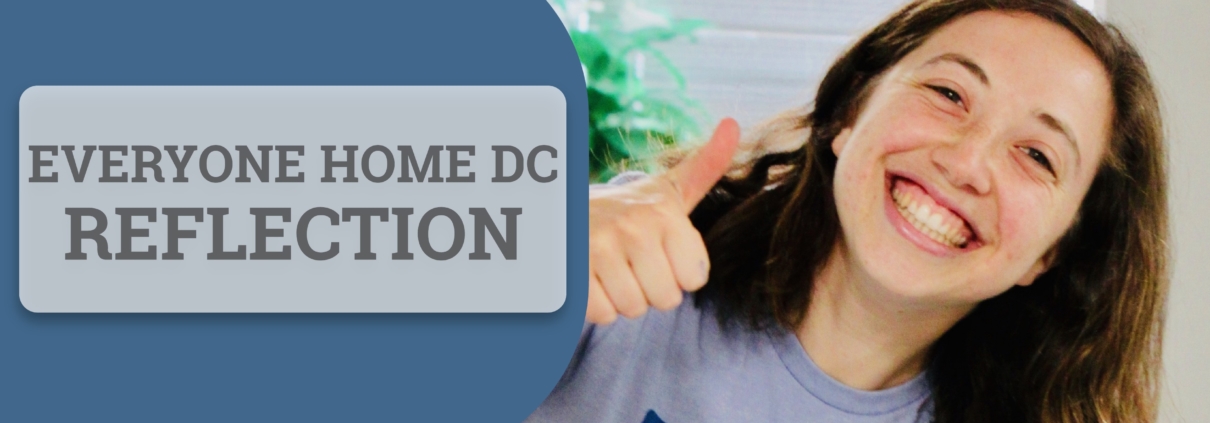A Reflection After a Year of Service
*Names and identifying details have been changed to protect the privacy of individuals staying outside that Everyone Home DC works with.
Sue and Moe were in deep discussion when Brett and I approached the park bench. We were on an afternoon outreach walk handing out waters and snacks to people staying outside. “Can you settle something for us?” Sue said, after we had exchanged greetings, “Who sings Remember When?” Brett pulled up the song on her phone. “It’s Alan Jackson,” I told her, looking over Brett’s shoulder. Moe did a small celebration interspersed with a bit of gloating. “Okay, okay,” Sue said, “I can admit when I’m wrong.” To us, she explained, “I thought it was George Strait.” To Moe, “I guess I owe you 25 cents.”
We played that song for them, then another and another. As Moe danced with the music, Sue started talking about her life, growing up in Florida, the family she had there, her mother’s health, her constant fight with addiction and the toll it has taken on her life. She looked sometimes at me, sometimes off down the street as she told me about her missteps and mistakes and all the effort she has put in to get back to where she wants to be. Her eyes filled with tears at some parts, at others, she chuckled with the memory. I was acutely aware in that moment that the relationship we fostered in the easy times was the foundation for assistance and support in the harder times.
I don’t think I could have imagined earning such trust and camaraderie when I accepted a position on Everyone Home DC’s street outreach team. I have worked at Everyone Home DC for the past year through the Avodah Jewish Service Corps. Avodah offers young Jewish adults the opportunity to learn and grow as Jewish social justice leaders through living in an intentional community, learning with social justice experts, and engaging in direct service work at a local anti-poverty organization.
Every day, I work with people who are experiencing homelessness to help with food, clothing, applying for IDs or Medicaid or food stamps, discussing employment opportunities, and generally supporting them in removing barriers to obtaining housing. In the evening, I go home to my housemates, who have spent their days renewing DACA applications, delivering food to people with chronic illnesses, advocating for Medicaid patients, organizing local Jewish institutions around social justice issues, teaching tech skills to low-income residents. We share successes and hardships, offering emotional support and resources our organizations can provide for each other’s clients. A couple times a week, we have programs where we discuss foundational issues of racism, privilege, and the Jewish connection to social justice that directly impact our work and relationships with clients. For me, the weekly learning and discussion combined with the daily confrontation of the real-world consequences developed a profound understanding of issues of homelessness and housing insecurity.
I wanted to work at Everyone Home DC because I thought homelessness was, at its core, an easy problem with an easy solution. Since I believe there is enough physical space for everyone to have a place to live, I thought it was just a matter of organizing a system to put people in that space. As I learned from attending advocacy events with The Way Home Campaign, housing is the solution. Housing ends homelessness. But homelessness is not just about whether or not you have a place to stay. I have learned about the barriers of mental health and addiction and employment and systemic oppression that makes it harder for some to achieve their goals than others. So many times this year, I have heard clients imagine how job interviews would be different if they could get a full night’s sleep, take a shower, and put on clean clothes before meeting with a potential employer. Doctors, nurses, and clients have all told me how hard it is to maintain a rigid schedule of taking medicine when they have nowhere secure to store their meds, they don’t know if they will be able to get a meal beforehand, or they have no way of setting a daily timer to remind them.
I feel so fortunate to have had the opportunity to learn from and be inspired by my clients, my coworkers, my housemates, and the larger DC community. Everyone should, at some point in their life, engage in direct service. It fosters such a deep sense of empathy. It is a reminder that everyone has a story that goes beyond their current circumstances, a past, a family (biological or chosen), skills and expertise, motivations and desires, and obstacles they have overcome or are still working to overcome. As a resident of my neighborhood, my city, my country, the world, I am a part of the community. The whole community. And as a community member, I have a responsibility to treat my neighbors well and stand up for their rights. Thank you for this opportunity and this experience to be part of your community.
By Orli Hendler – Orli participated in AVODAH: The Jewish Service Corps 2018-2019 and worked with Everyone Home DC’s Street Outreach program during her Avodah year. Orli Hendler grew up in Atlanta, Georgia and graduated from Emory University. In college, Orli witnessed diversity and inequality in her community and in the world at large, through her experiences as a Resident Advisor as well as an Emory delegate to the UN climate change conference. After studying linguistics and environmental science, she decided to dedicate her year to directly address inequalities by serving others. Avodah not only offered this opportunity but provided a wonderful Jewish community with which to live. In her free time, Orli enjoys playing soccer, practicing circus arts, and road tripping around the country.



